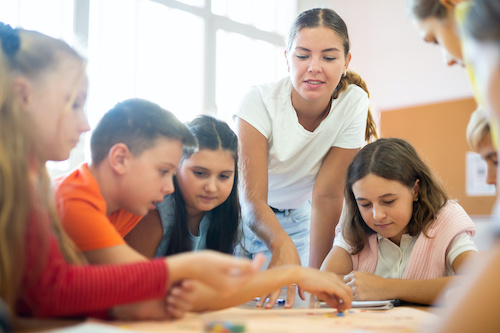This story was initially printed by Chalkbeat. Join their newsletters at ckbe.at/newsletters.
Since faculty buildings reopened after COVID closures, I’ve heard lecturers say, repeatedly, that the older elementary youngsters of their lecture rooms are simply not the identical.
I lead a small community of colleges, and plenty of of our present fourth graders stay depending on adults’ opinions and discover it onerous to maneuver from one drawback to the following with out reassurance. Our fifth graders can resolve a primary math drawback however usually battle to elucidate how you can reply a phrase drawback. Throughout fourth, fifth, and sixth grades, we’re seeing college students have hassle with sharing, taking turns, and dealing with others — signs of the developmental milestones many youngsters missed lately.
What precisely did they miss?
As an early childhood specialist who taught kindergarten by way of second grade for 12 years, I keep in mind watching the development of cognitive and social growth all through the early elementary faculty years.
Initially of kindergarten, my college students would bunch collectively, crowding on the door, massing round me, all asking questions or wanting to indicate me the boo-boo on their finger. Generally, it appeared like they didn’t even discover that they weren’t the one youngster within the room. They needed to discover ways to exist in a big group.
As soon as they discovered how you can handle in a gaggle, we started the work on interpersonal relationships, like how you can share, reply to a query, and present empathy. Kindergarteners ceaselessly reply to questions with unrelated statements of truth which might be of curiosity to them. For instance, if I had been to ask the category, “What do you discover about the principle character on this story?” they could say, “My uncle is getting a pet this weekend” or “I had pancakes for breakfast.” All yr, they progressed towards understanding that their perspective wasn’t the one view of the world.
My first graders did perceive that there have been different folks and views. This made them good at working with companions. They needed to please the adults by following the foundations at college, however their good intentions may fall by the wayside in the event that they needed one thing badly sufficient. As a result of they knew the foundations however couldn’t assist however break them typically, first graders would typically lie. “No, I didn’t do it!” was a frequent chorus.
For first graders, the playground was a magical place stuffed with fairies, knights, and superheroes, as a result of all you wanted was the suitable stick or flower or somewhat scarf tied round your neck to remodel. These kind of imaginary video games are a part of creating complicated representational thought, which helps our minds visualize characters in novels, perceive the symbols that stand in for equations in algebra, and suppose by way of quite a lot of outcomes so we are able to make strategic life choices.
My second graders had been terrified of constructing errors and froze up when what they had been attempting to attract didn’t sustain with their underdeveloped fantastic motor expertise. They needed a whole lot of reassurance. They needed to have the ability to do the issues the large children did, however they weren’t fairly certain how. They thrived on routine and dealing collectively to deal with sophisticated duties, whether or not it was creating a category newspaper or backyard, or operating the varsity publish workplace. Second grade was all the time my favourite due to that unbelievable industriousness.
Remoted at residence in the course of the pandemic, early elementary faculty college students missed out on complicated, make-believe play and had grown out of it by the point all of us acquired again. I fear that this could be getting in the best way of duties that require symbolic reasoning. We see, for instance, that our fifth graders can reply a factual query about one thing they’ve learn however battle to make cheap inferences.
Many grades have had to return just a few years to show college students a few of the extra primary ideas. Now we have adopted a social-emotional curriculum that teaches youngsters to acknowledge and title their emotions, how you can calm themselves down, and how you can clarify to a different individual the impression of their actions on them.
There may be a lot to review concerning the impression of these two COVID years on studying that I’ve little doubt it is going to be the topic of Ph.D. dissertations for many years. However within the meantime, colleges and educators are tasked with catching college students up on what they missed. The New York Instances lately printed an article with a software the place you could possibly kind in your native faculty district and see how far behind it was in math and studying in comparison with the pre-pandemic years.
I imagine in assessments. It’s essential to grasp what your college students know and nonetheless must be taught with the intention to educate them effectively. However it’s additionally necessary to recollect that there’s way more to youngster growth than studying multiplication tables or the basics of studying. Whilst we gauge tutorial progress and gaps, we should acknowledge the opposite expertise that so a lot of our college students must atone for as effectively.
In our rush as adults to be over this pandemic, let’s not deprive our college students of the time they should discover who they’re in relation to their friends. In flip, hard-working lecturers and faculty leaders want grace as they fight to determine how you can give each child what they want and deserve at this unprecedented second.
Chalkbeat is a nonprofit information website protecting instructional change in public colleges.
Associated:
The pandemic is over–however American colleges nonetheless aren’t the identical
“Bold development” is required to speed up studying restoration
For extra information on COVID-related restoration, go to eSN’s Instructional Management hub


